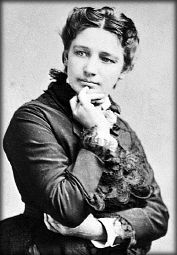The Irrepressible Mrs. Woodhull

With her sister, Tennessee Claflin, Victoria Claflin (better known as Victoria Woodhull) was notorious for chipping away at social taboos involving religion, sex, business and politics. She was an ethical gadfly with a tarnished pedigree, a screwball pioneer where pioneers were not invited or even tolerated, and it is only in hindsight that we can appreciate some of her adventures, since they represent the first bold gestures toward the multifarious identity of the 20th century American woman.
Born on this day in 1838 in Homer, Ohio, Victoria grew up on the run; her father having been accused of insurance fraud, he brought his family along as he wandered throughout the Midwest posing as a faith healer. At 15, she married a Chicago physician of questionable character, Canning Woodhull, and they proceeded to move from coast to coast, Victoria supporting Canning's bad habits and her retarded son Byron with sewing jobs and as a spiritual healer in the mold of her huckster father.
At 26 Victoria divorced Canning, and joined Tennessee to travel as faith healers and clairvoyants. They had brushes with the law, including being accused of running a whorehouse in Cincinnati, but generally they survived by their wits. Victoria remarried in 1866 to Col. James H. Blood, a Civil War vet who introduced her to socialism and free love, and 2 years later they moved to New York in answer to the suggestion of the spirit of Demosthenes, whom Victoria claimed appeared before her in a hotel room in Pittsburgh.
In New York, Tennessee was asked to perform a healing massage on tycoon Cornelius Vanderbilt. Soon, with Vanderbilt's assistance, the sisters were speculating successfully on Wall Street, opening their own brokerage house in 1870. Woodhull, Claflin & Co. was the first woman-owned enterprise of its kind, and was a moderate success. Around the same time, Woodhull became captivated by the utopian ideas of Stephen Pearl Andrews. Together with Blood and Tennessee, Woodhull and Andrews promoted their ideas in Woodhull and Claflin's Weekly, along with running translations of George Sand and the first American appearance of Marx and Engels' Communist Manifesto -- this despite the fact that Woodhull was a Wall Street tycoon.
Around the same time, Woodhull announced her candidacy for president, and began to give speeches which were an interesting melange of progressive politics and bold assertions of sexual independence for women. Benjamin F. Butler arranged to let Woodhull speak on women's suffrage before Congress, a move which caught Susan B. Anthony and Elizabeth Cady Stanton by surprise and caused them to invite her to speak at the National Woman Suffrage Association convention.
Her participation in the convention allowed critics to conclude that women's suffrage would lead to pernicious free love and the breakdown of the family. Rather than quieting the critics, she continued to advance the cause of free love in bold terms, stating in an 1871 speech that she had "an inalienable, constitutional and natural right to love whom I may, to love as long or as short a period as I can, to change that love everyday." With support from Susan B. Anthony and the rest of the suffragettes drifting away, she convened her own Equal Rights party convention, which nominated her for president and African-American leader Frederick Douglass as vice president. Douglass ignored the honor, and like Anthony, supported Grant's re-election in 1872.
Soon afterward, her successes began to fall apart: with expenses mounting (even Canning Woodhull had joined the eclectic household in New York by this time), she and her extended family were evicted from her New York mansion, the brokerage house was in a shambles, and Woodhull was sued for her debts.
Lashing out at those who she perceived were exercising their sinister indirect influence on her financial affairs and who would seek to co-opt her radical reform crusade with half-measures, she gave a speech accusing moderately reform-minded preacher Henry Ward Beecher, a former lover of Woodhull's, of having an extramarital affair with another woman, and published an account of it in the Weekly. She was arrested on the eve of the election for peddling obscenity, and spent election day and a month more in a New York jail cell. Released on bail, she put out another issue of the Weekly; was reindicted; and went on the lam, speaking around the country about the Beecher affair. The obscenity charge was later dropped, and Beecher's mistress published a full confession of the tale.
Blood continued the Weekly until 1876, when he and Woodhull divorced; and the following year Woodhull moved to England (in part to avoid giving testimony in a dispute over Vanderbilt's will). There she met and married a wealthy banker, John Martin, against the objections of Martin's family (the story provided the basis for Henry James' story, The Siege of London). In 1892, Woodhull again declared herself a presidential candidate, to considerably less attention, and visited the U.S. from time to time to speak on eugenics, women's suffrage, public health reform and government assistance for science and the arts. She died on June 10, 1927 in London.
Labels: Business and Finance, Presidential Campaigns, Trailblazing Women





0 Comments:
Post a Comment
Subscribe to Post Comments [Atom]
<< Home